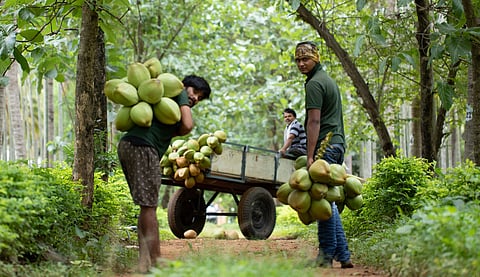

A sip of that divine coconut water can satiate not just a parched throat in summers, but also add to the euphoric mood during monsoons. But while sipping on this elixir-esque beverage, have we ever wondered about the hands that have tirelessly nurtured the tree the coconut grew on, come rain or shine? Well, the founder and CEO of Econut Coconut Producer Company Lloyd Edward did. After all, he came from a family of coconut farm owners, who still have their own three-acre farm in Gaddige, Karnataka. And he was well aware that a coconut purchased for eight or ten rupees from the farmer was sold for as high as Rs 35 or even 40 in Bengaluru. So in May 2015, this farmer producer organisation was formed.
With our farmer brothers
"It all started because we wanted to do something for our own farming community," says Lloyd, who back then, was working as a Software Engineer at TCS. They started with over 1,000 farmers and selling through them, every farmer used to get Rs 18 for every coconut, that's Rs 10 more than what they used to get. The procurement, transportation and selling was all the responsibility of Econut. Every farmer used to earn 60 per cent more than what they used to earn on a per annum basis. When the rest of the farmers started noticing this scale of growth among their own community, they themselves came forward to join hands with Econut and today, they have over 7,000 farmers on board. They were supported by the Coconut Development Board (CDB), Ministry of Agriculture and Farmer Welfare, Government of India. Eventually, they received Rs 22.5 lakh funding from National Bank for Agriculture and Rural Development (NABARD), were incubated at IIM Bangalore and currently, have been selected by Capgemini for a three-year long incubation programme.
As far as procurement goes, two small trucks procure all the coconut from farmers and transport it to their 30-acre farm in Kengeri and from there, a big truck takes it to over 17 kiosks they have in various IT parks of Bengaluru like TCS Think Campus, Think Tree Phase 2, Global Village, Prestige Tech Park, Gopalan Global Axis and so on. These coconuts are cut by contactless machines at these kiosks and served to customers.
Generating local jobs
"But this is not just a transaction between us and our farmers, we develop a relationship with them," explains Lloyd who pursued IT from Sri Jayachamarajendra College of Engineering in Mysuru. They encourage farmers to purchase shares of their company, each share is capped at Rs 1,000 by Small Farmers’ Agri-Business Consortium. This way, the farmers also earn profits. More importantly, Econut has also created employment among rural youth. With the help of CBD, they purchased 600 machines that make it easier for people to climb the coconut trees to harvest coconut. And this is being used by 600 youngsters in the six villages they operate in and the youngsters even earn Rs 20 for every tree they harvest. And with the help of RUDSET Institute, Mysuru, the young women in the villages learn how to make coconut barfi, coconut cookies, and brooms from the fallen leaves of the coconut tree. Over 65 girls are employed thus. "This way, we are trying to solve the problem of rural migration by creating employment opportunities for the sons and daughters of our farmers," he explains. They also offer jobs like procurement manager, office staff and so on to the youngsters.
Furthermore, Econut also makes use of the empty coconut. These shells are collected back by their truck from the kiosks. Then, the shells are ground and turned into powder and returned back to the farmers who use it as manure in their farm. This is their bid to move towards being a zero-waste start-up. The team is also planning to offer products like desiccated coconut, virgin coconut oil via Amazon, Flipkart and Big Basket. They signed an MoU with Central Food Technological Research Institute (CFTRI). Mysuru on July 1 and the central government body will test and certify their products. They have sanctioned a two-acre government industrial land and are in the process of setting up an industry there.
For more on them, check out econut.in
